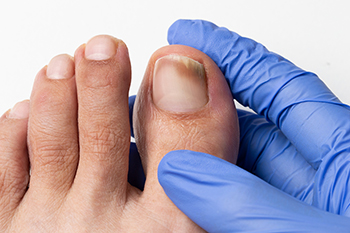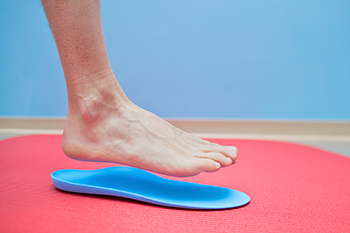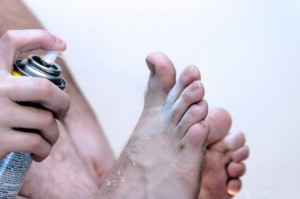Items filtered by date: August 2023
Causes and Preventive Measures for Toenail Fungus

Toenail fungus, medically known as onychomycosis, is a common nail infection caused by fungal organisms that thrive in warm and moist environments. This condition typically starts as a white or yellow spot under the tip of the toenail and can spread to the other toenails, causing the nail to become discolored, thickened, and brittle. The fungi responsible for toenail infections live in areas such as public pools, showers, and locker rooms. Additionally, tight or non-breathable shoes can create an environment conducive to fungal growth. Preventive measures can include keeping the feet clean and dry, and wearing well-fitting shoes that are made from breathable materials. Additionally, it is beneficial to refrain from walking barefoot in public places. If you suspect a toenail fungus, it is suggested that you consult a podiatrist who can help to prevent its progression and guide you toward effective treatment methods.
For more information about treatment, contact Dr. Kevin Davis of Davis Foot & Ankle Centers. Our doctor can provide the care you need to keep you pain-free and on your feet.
Toenail Fungus Treatment
Toenail fungus is a condition that affects many people and can be especially hard to get rid of. Fortunately, there are several methods to go about treating and avoiding it.
Antifungals & Deterrence
Oral antifungal medicine has been shown to be effective in many cases. It is important to consult with a podiatrist to determine the proper regiment for you, or potentially explore other options.
Applying foot powder on the feet and shoes helps keep the feet free of moisture and sweat.
Sandals or open toed shoes – Wearing these will allow air movement and help keep feet dry. They also expose your feet to light, which fungus cannot tolerate. Socks with moisture wicking material also help as well.
If you have any questions please feel free to contact our office located in Springfield, TN . We offer the newest diagnostic tools and technology to treat your foot and ankle needs.
Exploring Orthotics for Foot, Leg, or Back Pain Relief

Orthotics are customized shoe or heel inserts made to address foot, leg, or back problems. Tailored to an individual's needs, orthotics can be a crucial component of treatment plans for various symptoms related to discomfort and pain in these areas. The aim of orthotics may be to correct foot deformities, improve foot and ankle function, provide ankle support, and reduce the risk of further injuries. Orthotics are used to address a number of medical conditions such as arthritis, back pain, bunions, bursitis, and diabetes-related foot issues. Orthotics also can be prescribed for flat feet, hammer toes, heel spurs, high arches, injuries, and plantar fasciitis. Orthotics can provide support, correct positioning, and alleviate stress on specific areas. They are often combined with supportive footwear, physical therapy, and medication for holistic treatment. Different types of orthotics, from rigid to flexible materials, cater to various conditions. Proper fitting and usage are essential for positive outcomes. If you have pain in your feet, legs, or back, it is suggested that you make an appointment with a podiatrist to see if orthotics may be a helpful part of a treatment plan.
If you are having discomfort in your feet and would like to try orthotics, contact Dr. Kevin Davis from Davis Foot & Ankle Centers. Our doctor can provide the care you need to keep you pain-free and on your feet.
What Are Orthotics?
Orthotics are inserts you can place into your shoes to help with a variety of foot problems such as flat feet or foot pain. Orthotics provide relief and comfort for minor foot and heel pain but can’t correct serious biomechanical problems in your feet.
Over-the-Counter Inserts
Orthotics come in a wide variety of over-the-counter inserts that are used to treat foot pain, heel pain, and minor problems. For example, arch supports can be inserted into your shoes to help correct overarched or flat feet, while gel insoles are often used because they provide comfort and relief from foot and heel pain by alleviating pressure.
Prescription Orthotics
If over-the-counter inserts don’t work for you or if you have a more severe foot concern, it is possible to have your podiatrist prescribe custom orthotics. These high-quality inserts are designed to treat problems such as abnormal motion, plantar fasciitis, and severe forms of heel pain. They can even be used to help patients suffering from diabetes by treating foot ulcers and painful calluses and are usually molded to your feet individually, which allows them to provide full support and comfort.
If you are experiencing minor to severe foot or heel pain, it’s recommended to speak with your podiatrist about the possibilities of using orthotics. A podiatrist can determine which type of orthotic is right for you and allow you to take the first steps towards being pain-free.
If you have any questions please contact our office located in Springfield, TN . We offer the newest diagnostic and treatment technologies for all your foot and ankle needs.
Common Causes of Foot Pain

Foot pain can significantly impact your quality of life, making it difficult to complete your daily activities. One common cause of foot pain is improper footwear, as wearing ill-fitting shoes or high heels can lead to foot disorders and discomfort. In addition, injuries sustained during high-impact exercises or sports activities, such as running or aerobics, may result in foot pain. This includes sprains, strains, fractures, and tears in ligaments, tendons, or muscles. Another cause of foot pain is osteoarthritis, which results from the overuse of cartilage surrounding the joints, particularly affecting the big toe. Rheumatoid arthritis also can lead to pain, stiffness, and swelling in the joints of the feet and ankles. For patients with diabetes, nerve damage, and reduced blood flow, foot ulcers may develop and cause persistent foot pain. Apart from these primary causes, various specific conditions can lead to foot pain, such as plantar fasciitis, corns, calluses, bunions, and ingrown toenails. Flat feet, heel spurs, tarsal tunnel syndrome, and Sever's disease are other causes of foot pain. If you are experiencing foot pain, it is suggested that you make an appointment with a podiatrist who can determine the cause and offer the appropriate treatment options.
Foot Pain
Foot pain can be extremely painful and debilitating. If you have a foot pain, consult with Dr. Kevin Davis from Davis Foot & Ankle Centers. Our doctor will assess your condition and provide you with quality foot and ankle treatment.
Causes
Foot pain is a very broad condition that could be caused by one or more ailments. The most common include:
- Bunions
- Hammertoes
- Plantar Fasciitis
- Bone Spurs
- Corns
- Tarsal Tunnel Syndrome
- Ingrown Toenails
- Arthritis (such as Gout, Rheumatoid, and Osteoarthritis)
- Flat Feet
- Injury (from stress fractures, broken toe, foot, ankle, Achilles tendon ruptures, and sprains)
- And more
Diagnosis
To figure out the cause of foot pain, podiatrists utilize several different methods. This can range from simple visual inspections and sensation tests to X-rays and MRI scans. Prior medical history, family medical history, and any recent physical traumatic events will all be taken into consideration for a proper diagnosis.
Treatment
Treatment depends upon the cause of the foot pain. Whether it is resting, staying off the foot, or having surgery; podiatrists have a number of treatment options available for foot pain.
If you have any questions, please feel free to contact our office located in Springfield, TN . We offer the newest diagnostic and treatment technologies for all your foot care needs.
Are Bunions Affecting Your Everyday Life?
How to Battle Athlete’s Foot

A common enemy that can bother athletes and people from all walks of life is athlete's foot. Despite this being an uncomfortable foot condition, there is essential information that can provide relief. Athlete's foot is a fungal infection that lives and thrives in warm, damp places, such as sweaty socks and locker rooms. It is considered to be contagious, so sharing shoes or walking barefoot in public areas can lead to trouble. Some methods can be implemented which can help to prevent athlete's foot. This can begin with washing the feet with soap and water, followed by keeping them clean and dry. It is beneficial to change the socks and shoes often and opt for breathable materials such as cotton. Additionally, it is helpful to wear appropriate shoes such as flip-flops or water shoes while in public showers and locker rooms. If you suspect you have athlete's foot, do not hesitate to call a podiatrist. It is suggested that you visit this type of doctor who can prescribe antifungal creams or powders that can defeat the infection.
Athlete’s foot is an inconvenient condition that can be easily reduced with the proper treatment. If you have any concerns about your feet and ankles, contact Dr. Kevin Davis from Davis Foot & Ankle Centers. Our doctor will treat your foot and ankle needs.
Athlete’s Foot: The Sole Story
Athlete's foot, also known as tinea pedis, can be an extremely contagious foot infection. It is commonly contracted in public changing areas and bathrooms, dormitory style living quarters, around locker rooms and public swimming pools, or anywhere your feet often come into contact with other people.
Solutions to Combat Athlete’s Foot
- Hydrate your feet by using lotion
- Exfoliate
- Buff off nails
- Use of anti-fungal products
- Examine your feet and visit your doctor if any suspicious blisters or cuts develop
Athlete’s foot can cause many irritating symptoms such as dry and flaking skin, itching, and redness. Some more severe symptoms can include bleeding and cracked skin, intense itching and burning, and even pain when walking. In the worst cases, Athlete’s foot can cause blistering as well. Speak to your podiatrist for a better understanding of the different causes of Athlete’s foot, as well as help in determining which treatment options are best for you.
If you have any questions please feel free to contact our office located in Springfield, TN . We offer the newest diagnostic and treatment technologies for all your foot and ankle needs.
What Are the Education Requirements to Become a Podiatrist?

A podiatrist is a physician who treats disorders of the feet and ankles. These can include ailments such as tumors, fractures, and abnormal foot structures. This branch of medicine requires an extensive education, and qualified candidates will have the letters DPM, Doctor of Podiatric Medicine, appear after their name once completed. The training begins with obtaining a bachelor's degree, followed by enrolling in a podiatric school for four years. A residency program that takes three years to finish will begin after podiatric school is completed and can give the student experience in working in a hospital or clinic environment. A podiatrist can choose to work in a private office setting or may prefer to work in a hospital or an extended care facility. A podiatrist can have a flexible work week, and this can be a desirable factor in pursuing this field of medicine. If you are interested in becoming a podiatrist, it is suggested that you confer with this type of doctor who can address any questions and concerns you may have.
If you are dealing with pain in your feet and ankles, you may want to seek help from a podiatrist. Feel free to contact Dr. Kevin Davis from Davis Foot & Ankle Centers. Our doctor can provide the care you need to keep you pain-free and on your feet.
What Is a Podiatrist?
A podiatrist is a doctor of podiatric medicine who diagnoses and treats conditions of the foot, ankle, and related structures of the leg. Your podiatrist may specialize in a certain field such as sports medicine, wound care, pediatrics, and diabetic care. Podiatrists have the ability to become board certified through training, clinical experience, and then taking an exam.
What Do Podiatrists Do?
On a daily basis, a podiatrist may perform the following activities:
- Diagnose foot ailments such as ulcers, tumors, fractures, etc.
- Use innovative methods to treat conditions
- Use corrective orthotics, casts, and strappings to correct deformities
- Correct walking patterns and balance
- Provide individual consultations to patients
It is very important that you take care of your feet. It’s easy to take having healthy feet for granted, however foot problems tend to be among the most common health conditions. Podiatrists can help diagnose and treat a variety of feet related conditions, so it is crucial that you visit one if you need assistance.
If you have any questions please feel free to contact our office located in Springfield, TN . We offer the newest diagnostic and treatment technologies for all your foot and ankle needs.

